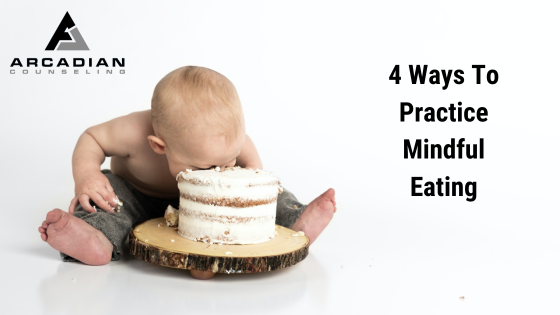You plop down on the couch front of the TV with a bag of chips or pint of ice cream intending to eat one serving, but before you even know what’s happened, you’ve plowed through half a Netflix series and the whole bag or pint is gone. Worse yet, you have no real recollection of tasting or even enjoying it. You just devoured the whole thing on autopilot. In case you’re wondering, this is NOT mindful eating.
Sound familiar?
Sadly, this is how many people eat every meal of every day, without any awareness of the food or how much of it they eat. This is mindless eating, and it is the cause of overeating and weight gain (not to mention a whole slew of health problems).
What is Mindful Eating?
Mindful eating is exactly what it sounds like – it is the practice of becoming more aware of what and how much you eat. It is not a fad diet, which are short-sighted (and often unhealthy and unsuccessful) approaches to eating. And there are no specific recipes to follow.
Mindful eating is a long-term, healthy approach to eating. It’s about cultivating a relationship with your food, instead of being controlled by your food.
When you eat mindfully, you learn taste and savor (read: enjoy!) each and every bite.
How Do I practice mindful eating?
1. In Sight – In Mind
I’m sure you’ve heard the old saying; “Out of sight. Out of mind?” Well the opposite is also true – the food we see we tend to want to eat. If you have tubs of ice cream in your freezer and Cheetos in your pantry, you’re going to gravitate toward these when you’re hungry and your blood sugar is low. The next thing you know, you’ve destroyed the entire bag of Cheetos – and your sense of self-worth.
Mindfulness for mindful eating starts at the grocery store. Stop buying junk foods loaded with sugar and preservatives, and opt for healthier foods and snacks like fresh produce and nuts. Strategically place these healthy options around your home and kitchen so you can’t help but see them first the next time you reach for something to eat.
2. Stop Multitasking
When was the last time you sat down to eat – and only eat? Stop eating in front of the television. Stop eating at your computer. Stop shoving food in your face while you brave the morning or evening commute. And if you absolutely must work through your lunch break, try alternating between tasks so you can focus on one entirely at a time.
For example, focus on writing and sending that email. Then switch tasks and spend a full minute or two on eating your lunch, savoring each bite. Then switch to another task, and back to eating and so on.
3. Slow Down

To practice mindful eating, you need to start by slowing down.
Unless you’ve entered a pie-eating contest, there’s no rush. (And seriously who does that?) Too many of us wolf down our food like our older brother is going to steal it. Then we wonder why we feel so sick. Pace yourself.
In your mind as you chew, repeatedly tell yourself to slow down. Notice the texture of the food in your mouth. Notice the temperature of food. Try to see how many flavors you can identify. Consciously chew on both sides of your mouth. Eventually slow, purposeful eating will become an ingrained habit, but in the beginning you need to train yourself
4. Gauge Your Hunger

When was the last time you were eating and stopped and asked yourself if you were still hungry?
How hungry are you when you begin to eat? Are you even hungry at all, or are you eating because of how you’re feeling emotionally?
Before you dive into that large pizza with the works, check in with your real hunger level. On a scale of 1-10, if your hunger is a 3, one slice should suffice. If you’re not hungry but in a bad mood because your boss is an asshole whose making you stay late, don’t eat the pizza. Instead, shift your attention to something other than food like a quick funny YouTube video. Or mentally plan out all the enjoyable things you’re going to do after work. Or fantasize about running your boss over with his car. Either way, don’t eat the pizza.
Simple? Yes. Easy? No. But, like most things, it gets easier with practice.
Infuse these tips into your everyday life and you’ll be surprised how mindful eating can change your entire life. From the size clothes you wear, to your health, to how in control you feel of your life.
James Killian, LPC is the Principal Therapist & Owner of Arcadian Counseling in Greater New Haven, CT where they specialize in helping over-thinkers, high achievers, and perfectionists reduce stress, increase fulfillment and enhance performance so they can move From Surviving To Thriving.



